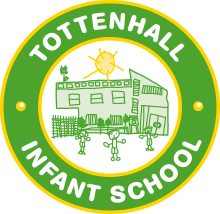English
The development of children’s language is crucial to their success across the curriculum. We want pupils to be excellent communicators, to listen actively and to speak with confidence. At Tottenhall Infant School pupils are helped to develop a love of reading and become skilful imaginative writers. Each year group has statutory elements of English which have to be covered. These involve fundamental elements of English such as reading, comprehension, composition, spelling, grammar and punctuation.
Writing
We believe that the learning of writing skills should be embedded across the school. Opportunities for cross curricular links are provided to ensure extended writing is evident across the curriculum. The key skills of writing e.g. spelling, composition are therefore taught explicitly in the context of English lessons, but also indirectly through cross curricular writing tasks in other subjects.
To enable children to develop as effective writers we will teach them to:
- Write for a range of purposes and genres
- Plan, draft, revise and edit their own writing
- Organise and structure sentences grammatically and whole text coherently
- Use accurate punctuation and spelling
- Have fluent and legible handwriting (see handwriting policy).
Our Approach to Reading
Reading is a key and vital skill for our pupils to be able to access the breadth of the curriculum at Tottenhall Infant School. It is a key contributor towards children’s language and communication development as well as improving children’s vocabulary. Reading leads to more highly developed language skills and improves the child’s ability to write well and communicate in a range of contexts and forms.
In addition, reading is a fun and imaginative time for children, which opens doors to all kinds of new worlds for them. The reading curriculum at our school teaches children about the world around them. Through reading a variety of books our children learn about people, places, and events outside of their own experience. As a school we have ensured that we have a range of books and reading materials for children to access and design the curriculum around issues that matter to them such as recycling, friendships, planting and the natural environment.
Being able to read improves children’s concentration, self-esteem and empathy. As children develop, they begin to imagine how they would feel in that situation, place or event.
We understand that reading promotes achievement in all subjects, not just English. Children who are good readers tend to achieve better across the curriculum. We believe this is crucial in improving the life chances of our pupils. The curriculum is adapted to meet the needs of all learners where they are able to make progress and access learning.
All classrooms have inviting reading corners, with fiction and non- fiction books, and dual language texts. Books are sent home frequently. Across the school a reading record book is maintained to encourage a home school partnership. Children have access to a range of appropriate book banded texts to read both at home and school. These books are well matched to children’s phonic knowledge to allow them to make good progress. In order to foster the love of reading we organise termly visits to the local library for children, have a focus author of the month and opportunities for children to listen to adults read. We empower our children by ensuring reading skills and opportunities intersect all areas of the curriculum.
Phonics
At Tottenhall Infant School we use Little Wandle Letters and Sounds Revised. This is a complete systematic synthetic phonics programme (SSP) developed for schools by schools. It is a complete teaching programme meeting all the expectations of the National Curriculum and prepares children to go beyond the expectations of the Phonics Screening Check.
This is a systematic programme for teaching phonic skills for children starting in the nursery, with the aim of them becoming fluent readers by age seven. It is a recognised synthetic phonics scheme where children first learn their letter sounds and names, and then apply these to word building. The children will also learn a variety of other key words by sight.
Reading in class
In reception children have a weekly guided reading session using texts that are clearly matched to their phonic level.
In year KS1 children are taught reading through guided reading sessions using texts that matched to children’s phonic levels and reading fluency. Children are expected to use their skills to discuss books, vocabulary, authors, share opinions and answer a range of verbal and written comprehension questions.
How you can help your child with reading
We always value the support parents give their child at home. Please ensure your child is reading every day and leave a comment in their reading record. You can also visit the local library and remember to attend our reading breakfasts during the year.




